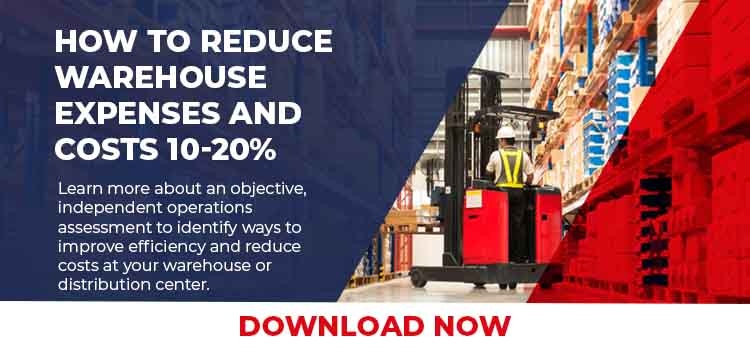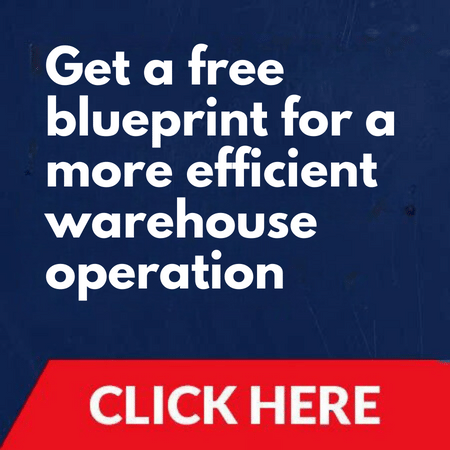Understanding Dock to Stock Times

Every fulfillment center faces the same daily pressure to meet service levels, and much of this starts with the receiving process. This makes dock to stock time one of the most important metrics. What is dock to stock time?
Dock to stock time measures how long it takes to process received inventory is put into a stock location. Efficient processes start with effective warehouse receiving procedures at the loading dock. Being cost effective with received goods also allows other processes to run smoothly.
In the supply chain, best in class fulfillment operations have a dock to stock time that is typically around two to six hours. This is really only achievable by having ASNs, dock scheduling, a strong vendor compliance manual, and a strong warehouse management system (WMS).
For many companies, we tend to target a window of approximately four to eight hours for dock to stock times – to 24 hours with accurate inventory counts.
In comparison, the warehouse staff of many small to medium businesses dock-to-stock may average 24-48 hours, or longer. Some receipts will sit for days awaiting resolution by the buyer and the vendor or some necessary rework in the warehouse.
A significant amount of focus is on picking, packing and shipping processes from a labor perspective. But these processes can be even more efficient when the processes in the receiving area are finely tuned. It all starts with quick, accurate stock counts before storing inventory.
Most companies should set a goal to clear the dock and staging areas in the same shift. This assumes limited quality assurance (QA) tasks which may require various receiving inspections, or in some cases product testing.
Most companies should set a goal to clear the dock and staging areas in the same shift. This assumes limited quality assurance (QA) tasks which may require various receiving inspections, or in some cases product testing. However, if a more in-depth QA process is needed, the dock and staging areas should be cleared within 24 hours. By improving dock to stock efficiency, this will improve order fulfillment, reduce operational costs, and minimize time consuming tasks.
Ways to Improve Dock to Stock Processes
1. Vendor Compliance Manual and Policies
These policies will help speed up the dock to stock processes and processing of inbound receipts. A vendor compliance manual typically includes several criteria:
- Technology: Have vendors commit to using ASNs, Barcodes, and EDI. This means having a good warehouse management system (WMS) and inventory management systems.
- Designated freight carriers: Do not leave carrier selection up to the vendor. Vendors typically have little concern about cost or service and might be making a profit on shipping.
- Packaging specifications: Be sure to include outer box specifications that protect from damage or act as a ship alone container.
- External carton labeling: Require purchase order number, SKU number, description, your company information (name and address), number of cartons (identified as 1 of X, 2 of X, etc.).
- Product specification sheet: Streamline quality assurance by requiring product specifications in a standard format.
- Procedures and practices: Set standard practices in order to quickly address quantity variances, damages, and any other specifications when not met. These may include chargeback policies as well.
- Return to vendor procedures: Hold merchandise for buyer and vendor approval and process vendor credit and inventory transactions.
Even the smallest company should consider vendor compliance policies such as inbound freight routing. Inbound freight is a considerable expense in the supply chain – every dollar saved using your carrier is profit. This task will result in significant dock to stock efficiency. This next article can help you learn how to achieve warehouse efficiency with vendor compliance.
2. Adopt Advanced Shipping Notifications (ASN)
ASNs are used to notify a customer/vendor of incoming shipment of product to their facility. They can be paper or electronic notifications and typically include PO numbers, item numbers, quantity, etc. This can be done without full EDI deployment. This is one of the most beneficial process changes you can make.
Using ASN data about the scheduled arrival dates for inbound freight you can plan labor for the dock. This also allows you to plan staging areas and receiving inspection functions. Larger facilities require carriers to either call for an appointment or have regularly scheduled daily deliveries such as small parcel carriers.
3. Identify Returns from Other Receipts
Typically, UPS and FedEx show up each day customer returns and inbound small parcel shipments from various suppliers. For customer returns, use pre-printed return labels to quickly sort packages that should be sent to returns processing.
With some companies, such as apparel, these return rates can be as low as 8-10% to as high as 35%. this helps clear the receiving dock and staging area. Leaving customer returns and inbound receipts combined will lead to time consuming sortation later.
4. Improve Quality Assurance (QA) and Inspection
QA processes can vary between product suppliers. Process may be different if they are a new vendor, have a history of damages, or if the product is fragile.
Make sure the receiving department has specific QA and inspection instructions. This input must have input from the buyers. This way, the receivers know what to look for during receiving inspection.
Consider varying your inspection process based on each vendor’s compliance, quality, and accuracy history. Vendors that are consistently reliable would have fewer products inspected which reduce cost and processing time.
5. Set Up Cross-Docking
For back ordered products, cross-docking eliminates product handling labor by moving checked-in products directly to pack stations. This system bypasses the put-away and replenishment steps, speeding up order fulfillment. In order for this to be successful, the receiving system must prompt the receiving staff of back-ordered items.
6. Implement Barcode in Receiving
A barcodes in the receiving process for all containers, pallets, and cartons is much faster and accurate. Barcodes allows you to gain warehouse inventory accuracy and control with real-time product tracking. This reduces “lost” units to inventory accuracy and reduce warehouse costs.
7. Consider Third Party Logistics (3PL)
There are advantages to using 3PL for inbound transportation including:
- Third party logistics and traffic departments are expert in working with agents on international shipments and customs.
- Can consolidate shipments into full truck loads with your receipts with other customers.
- Experience with developing and implementing vendor compliance policies.
- EDI deployment for your business if they provide EDI services to other larger retail clients.
The advantages of third party logistics go beyond just the receiving processes and dock to stock efficiency.
9. Electronic Data Interchange (EDI)
Large companies, retailers, and multichannel merchants generally implement EDI technology solutions and vendor compliance policies. This dramatically reduces manual effort, paperwork errors and achieves faster put away. The real-time processes reduce communication lag time and problems between purchasing and vendors. All this greatly reduces the total cost to companies.
EDI documents and transactions vary based on trading partner requirements. Adherence to the retailers’ EDI specifications enforces 100% EDI compliance. Vendor and retailer communicate through portals. The most common retail EDI transactions include:
- EDI 810 - Invoice
- EDI 846 - Inventory Inquiry/ Advice
- EDI 850 - Purchase Order
- EDI 855 - Purchase Order Acknowledgement
- EDI 856 - Advance Shipment Notice
- EDI 860- Purchase Order Change Request – Buyer Initiated
10. Develop A Vendor Scorecard
A vendor scorecard is a great way to review vendor performance and a comparison against all other vendors. Your scorecard should be updated using a formal evaluation and assessment.
Factors should include the financial and service impacts vendors have on your business. A great time to review performance is alongside a order placement. Leverage the purchase order to gain new commitments from a vendor. This article explains how to create a vendor scorecard for your business.
Transportation costs, warehouse efficiency, and inventory accuracy start with efficient and an accurate receiving process. Make improving inbound transportation and these processes a priority. This tool will allow for greater measurement of dock to stock efficiency and dock to stock processes.
To learn how a warehouse consultant can help your operations achieve higher efficiency and throughput, check out resources such as a warehouse assessment.







SHARE